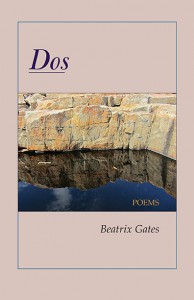How do we “ask the body to trust?” In this fervent, tiliting collection of poems, Bea Gates tracks the body’s “familiar/leaving in the dark,” a “motion blurring the break.” Before the outlines of bodies resolve as figures or events, the poems pause – letting the blur and break extend for as long as possible: “a hum through the wires,” “blood, a sound, life inside.” Gates senses into the kind of intensity that both resembles the sun and is destroyed by it. “Sage burns, sage blossoms,” writes Gates, taking us deeper into the borderline territory between a kiss and its opposite: radical breach, the place where the “downward path” disappears. And yet we follow it and the poems, with her, as far as we can go: “until their shape couldn’t be seen anymore, the poems moving out, away from us.” I was so moved by these deeply felt and known [never known] poems that are written without a map, and hence read without one too. A “disappearing journey” evanesces and reclaims the oscillating space where a narrative might be, in another kind of book. Not this book. Dos is for going and returning in complicated ways. I hope that you enjoy its wrecked, shimmering pilgrimage as much as I did.
–Bhanu Kapil, author of Schizophrene & The Vertical Interrogation of Strangers
Beatrix Gates’ “Dos” is the most moving, complex and important sequence of love poems I have read since Adrienne Rich’s 1977 “Twenty-One Love Poems.” It comes from the “two caverns of the heart” and the giant head of Benito Juarez, flickering and vibrating with the multiple meanings of love and history, and how they meet.
–Jan Heller Levi, author of Skyspeak, and editor of A Muriel Rukeyser Reader
These are gorgeous poems written with the utmost consideration for the line and the image. Written with such precision and care, I am reminded that language and words still matter, that the quiet “I” still matters amidst all that noise out there in the world.
–Truong Tran, author of four letter words & dust and conscience
(order from Finishing Line Press)
